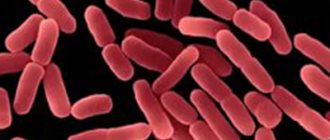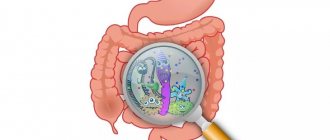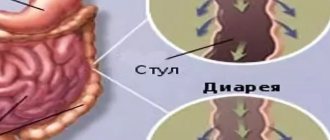Diarrhea is defined as loose stools occurring more than 3 times a day and accompanied by impurities in the stool, unusual odor and color. The causes of the disorder are very different, which causes a variety of accompanying symptoms. Viral diarrhea involves the transmission of infectious agents by contact or airborne droplets. As a rule, intestinal infections are transmitted in the first way. The disease equally affects both adults and children, although it is more often observed in the latter.
Symptoms of diseases
The general symptoms of infectious diarrhea of bacterial and viral origin are the same:
- increased body temperature;
- intoxication of the body, deterioration of general condition, weakness;
- loose stools with frequent, sometimes false urges;
- dehydration, with the appearance of cyanosis, pallor of the skin;
- pain, cramping in the abdomen;
- headache, pain in muscles, joints;
- vomiting, nausea;
- In acute bacterial infections, blood and pus may be present in the stool.
Rotavirus infection can be asymptomatic in 30-40% of cases among adults and children. Stool with rotavirus is light in color. There may be no diarrhea (about 40% of cases), but only vomiting and nausea may be observed in case of illness caused by the Norfolk virus.
You can pass copious amounts of watery stool and vomit with bacterial diarrhea caused by shigella, salmonella (with salmonellosis the stool is green), cholera, or rotavirus. Nausea, vomiting, and severe fever can occur with staphylococcus, gonococcus, and caliciviruses. Cytomegalovirus usually infects people with AIDS, in addition to diarrhea, which is manifested by enlarged lymph nodes (not to be confused with mononucleosis).
When to see a doctor
Infectious diarrhea cannot be ignored. It is easy to distinguish it from a mild disorder by its clear clinical signs. So, if you notice symptoms of infection, call a doctor immediately. Causes of concern should be:
- a sharp increase in temperature in the absence of symptoms of a respiratory infection;
- acute abdominal pain that does not stop throughout the day;
- detection of purulent or bloody inclusions in the stool;
- uncontrollable vomiting;
- fainting state.
Treatment of infectious diarrhea
If symptoms appear, you should consult a doctor. The selection of medications and therapy is carried out after identifying the pathogen that caused infectious diarrhea. If the pathogen is not identified, doctors can make a diagnosis: intestinal infection of unknown etiology with a predominant syndrome of colitis, enteritis (diarrhea), gastritis (vomiting).
Infectious diarrhea of a viral nature will not require long-term treatment other than replenishing fluid lost by the body and taking antiviral and antipyretic drugs. But to get rid of bacterial diarrhea you have to take prescribed antibiotics. Medicines and a set of therapeutic measures are prescribed after the studies have been carried out, taking into account the individual characteristics of the patient and are reduced to the following measures:
- diet prescription;
- rehydration therapy;
- adsorbents;
- antiviral drugs;
- antidiarrheals;
- antibacterial drugs;
- probiotics - to restore microflora;
- in some cases, gastric lavage with special probes and solutions is prescribed.
It is not recommended to undergo treatment or get rid of infectious diarrhea using traditional methods. This can lead to ineffectiveness and dangerous complications, especially in an elderly person or child.
Without waiting for an ambulance to arrive, you can begin to treat dehydration due to the loss of vital electrolytes with special preparations (Regidron) or ordinary non-carbonated mineral water. The liquid should be given in small portions every 10-15 minutes. To avoid fluid loss through sweat, the patient should be placed in a cool place and rested.
It is forbidden to eat milk, fruits, vegetables, and spicy foods until cured.
Causes of infection
- Consumption of unwashed raw vegetables and fruits, poor heat treatment of products, consumption of expired products.
- Lack of caution in public toilets and transport.
- Violations in personal hygiene, dirty hands, shared towels in the family.
- Poor sterilization of medical instruments and equipment.
The route of infection is often airborne from a sick person to a healthy person, when using common objects, in hospitals, during manipulations using unsterile instruments.
Young children attending kindergarten are highly susceptible to infection with infectious bacteria. The disease can be widespread in the summer, during the season of many fruits and swimming in open waters. There may be a whole group of reasons that led to the disease.
How long does diarrhea last with an intestinal infection?
Diarrhea of infectious origin is one of the most common diseases after colds and respiratory diseases of the upper respiratory tract. Diarrhea caused by viral infection accounts for about 10%.
Mild indigestion, which usually resolves after 3-4 episodes of diarrhea, can be easily distinguished from an acute infection, which is accompanied by deterioration of well-being and can last from 48 hours to 10-12 days. Diarrhea lasts differently for everyone, but on average its duration should not exceed 14 days. With a viral infection, diarrhea can be observed from 2 to 4-5 days. With a bacterial infection, diarrhea lasts longer, depending on the type of bacteria that caused it.
The symptoms accompanying an infectious intestinal disorder, with proper treatment, go away on their own and do not cause health-threatening complications or chronic relapses.
Routes of infection
The main route of infection with viral diarrhea is contact and airborne droplets. Infection can occur from a sick person to a healthy person through a handshake or touching objects of common use. The virus is often transmitted through food that cannot be treated with heat. These products include ice cream and salads. In the summer, at high temperatures, infection is possible when swimming in open water. Infection from water can occur through accidental ingestion. Sometimes you can get infected from animals. A combination of several routes of infection is often observed.
Viral diarrhea affects adults and children. When a pathogenic infection enters the body, a disease begins. Main viruses:
The most common variant is rotavirus. Children are more often infected, but the adult body does not have immunity against it.
What to do if diarrhea does not go away
It must be remembered that diarrhea is a manifestation of the body’s protective function; with its help, pathogenic microflora, toxins, and bacteria are eliminated. If you have diarrhea that lasts 1-2 days with a gradual decrease in intensity, it is better to do nothing.
It is important to follow a diet, exclude fatty, fried, spicy foods. You can take enterosorbents (activated carbon), rehydron. If symptoms do not go away within a few days or your health does not improve, you will need to consult a doctor.
If there is a recurrence of an intestinal infection that does not go away within several weeks, it is imperative to contact a medical specialist. After all, we can talk about chronic diarrhea due to ulcerative colitis, malabsorption of food, or intestinal cancer.
Prevention
Viral and inflammatory diarrhea can be prevented. Prevention measures are very simple:
- The best way to prevent viral diarrhea in infants is breastfeeding. Mother's milk contains all the necessary bacteria not only to digest food, but also to protect the baby's body.
- Contact with a sick person should be avoided to prevent infection.
- The home should be cleaned and disinfected not only during the entire course of treatment, but constantly.
- In case of diarrhea and to prevent recurrence of infection, all hygiene requirements should be carefully followed. In doubtful cases (after interacting with animals, visiting public places), it is recommended to use antiseptics.
- Only washed products can be consumed.
Viral diarrhea is an infectious disease transmitted by contact. Preventing such a disorder is easier than treating it: all you need to do is follow the rules of hygiene.
Possible complications
Doctors talk about a favorable outcome of intestinal infection in almost 100% of cases, provided proper treatment.
The main complication of long-term diarrhea is dehydration, especially in newborns, the elderly and unconscious patients. Dehydration and a large loss of minerals (electrolytes) can provoke the following patient conditions:
- hypotension, orthostatic collapse - weakness, dizziness when changing body position);
- renal failure;
- acidosis - increased levels of toxins in the blood due to decreased urination;
- hypokalemia, which causes heart failure;
- irritation in the anus and hemorrhoidal inflammation may occur.
The article was approved by the editors
Diagnostic features
As clinical experience shows, viral diarrhea can develop against the background of other respiratory intestinal infections or as an isolated disease. It is necessary to treat the underlying pathology.
A final diagnosis can only be made with available laboratory evidence and the exclusion of another cause of diarrhea.
Blood tests of patients with viral diarrhea reveal leukopenia (decreased white blood cell count) and lymphocytosis and monocytosis. Leukocytosis with a shift to the left indicates a bacterial infection.
If lymphocytosis and an increase in eosinophils (eosinophilia) are detected, then protozoa or helminths (giardia, chlamydia, E. coli) should be considered the “culprits” of the disease. In the urine, an increase in protein is detected, rarely red blood cells and hyaline casts.
The coprogram shows a significant amount of undigested fiber, starch grains, muscle fibers, and less commonly, leukocytes. Laboratory diagnostics consists of detecting and typing viruses in feces and antibodies in blood.
Methods used:
- enzyme immunoassay (ELISA);
- diffuse precipitation reaction and latex agglutination;
- complement fixation reaction and indirect hemagglutination;
- polymerase chain reaction method;
- electron microscopy.
In formulating the diagnosis, the doctor must indicate the type of infection, severity, localization (gastroenteritis or enteritis), complications.
When diarrhea appears with a delay of several days after other symptoms of intoxication, the more likely cause is dysbiosis due to the treatment used, disturbances in the composition of digestive enzymes, or a nosocomial infection.
It is necessary to take into account the possibility of functional disorders of the intestines during ARVI and influenza associated with neurotoxicosis. The watery nature of the stool accompanies infection with Escherichia, acute bacterial intestinal infections caused by Klebsiella, Proteus, Clostridia, Salmonella.
Tips and tricks
During treatment of viral diarrhea, it is important to follow a therapeutic diet (table No. 4b). It involves the exclusion of the following products:
- milk products;
- fresh juices;
- alcohol;
- fresh fruits and vegetables;
- smoked, fatty and spicy dishes;
- black bread;
- carbonated drinks;
- chocolate and products based on it;
- cold food;
- fast food;
- sweets.
At the beginning of the diet, it is recommended to adhere to a modest diet, giving preference to liquid foods: jelly, rice and oatmeal porridge with water, puree soups. It is important to drink enough fluids to reduce the risk of developing dehydration.
After you feel better, you can diversify your diet with other permitted foods. It is worth returning to normal nutrition gradually, monitoring the body’s reaction to each product. If your condition worsens or allergies occur, you will need to return to the original menu.
Viruses are one of the causes of diarrhea. Depending on the strain, a certain clinical picture is formed. The duration of the disease is usually 3-5 days, but can increase up to 1.5 weeks. For treatment, it is necessary to determine the viral nature of diarrhea and the specific type of pathogen.
p, blockquote 1,0,0,0,0 —>
Follow a diet
During an intestinal infection, you must adhere to a diet. This will help you quickly regain your strength and return to your usual activities. Completely eliminate dairy and fermented milk products from your diet. In this environment, bacteria multiply at an incredible rate. In addition, viruses can provoke and this will only worsen your condition. You need to give up sweets, fruits and vegetables. Don't eat fast carbohydrates. Carbonated drinks and alcohol are contraindicated.
In the first days you need to eat only rice and rice water. These foods will help you stop diarrhea and have a soothing effect on your stomach. If there is no vomiting, then you can eat chicken broth. If you have an increased appetite, add a few crackers to it. It is allowed to drink strong black tea without sugar.
Pathogenesis
Viruses damage the epithelium of the villi of the small intestine, on the surface of which lactase and other disaccharidases are synthesized. Their insufficient formation during the disease leads to the accumulation of undigested carbohydrates in the intestinal cavity and an increase in osmotic pressure, which increases the movement of fluid into the intestinal lumen and causes the occurrence of diarrhea.
In addition, with viral diarrhea in the mucous membrane of the small intestine, the synthesis of some biologically active compounds is reduced, which contributes to the accumulation of fluid in the intestine. Diarrhea is enhanced by fermentation processes in the cecum.
Development of the disease
Viral diarrhea has three stages of development in both children and adults.
- Incubation stage.
- Stage of expanded manifestation.
- The recovery stage lasts up to 10 days.
The incubation period lasts from hours to 1 week. At this time, damage to the gastrointestinal tract and the urge to vomit after eating and drinking are observed. Mucus and food debris are found in the vomit. Vomiting is accompanied by diarrhea. Some people have a sore throat, cough, chills, weakness, and fever.
At the stage of developed manifestations, the reaction of each organism is different. Depends on the patient’s immunity and the type of infection affecting the intestines. The main symptom of this stage is diarrhea, which lasts throughout the duration of the full-blown manifestations. Duration from 2 to 7 days.
With residual manifestations of the third stage, both diarrhea and vomiting are observed, but not as intensely as during the second stage. Symptoms persist until pathogenic organisms are completely eliminated from the human digestive system.











